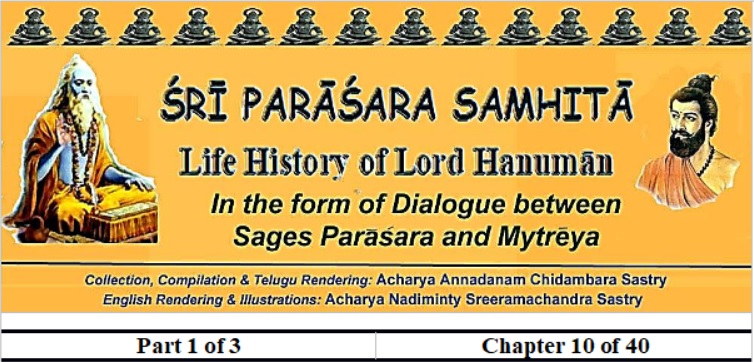
10th Chapter (Dasama Paţalah)
“The Story of Sun God’s Daughter”
(Sūryasutā Kathanam)
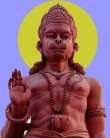
श्रीमैत्रये :
ध्वजदत्तो जपन्मंत्रं कदा सिद्धिमविंदत?
पुरश्चर्या: कति कृता:? पराशर! वदस्व मे।। 1
Mytrēya:
“Oh! Sage Parāśara! Reciting this mantra, after how long did Dhwajadatta attain achievement (siddhi)? Kindly tell me the same.”
श्रीपराशर:
शास्त्रोक्तविधिना विप्रो जपन्मंत्रमहर्निशम्
सिद्धिं नावाप मंत्रस्य तथापि जपति स्म स:।। 2
Parāśara:
“Oh! Mytrēya! The Brāhmin Dhwajadatta did not attain achievement (siddhi) of the mantra even after reciting it day and night. Even then, he continued recitation.
ग्रीष्मे तप्तशिलायां च वर्षासु सिकतातले
हेमन्ते शिशिरर्तौ च रात्रौ शीतजलांतरे।। 3
By remaining on a hot stone during summer, on a sandy place during rains, in cold water during winter (even)
जपन्नपि महामंत्रं सिद्धिं नावाप स द्विज:
निराहारो जितस्वाप: सर्वदा विजितेंद्रिय:
मनस्तत्रैव संयोज्य ब्राह्मा नैव विवेद स:।। 4
That Brāhmin did not achieve attainment. He controlled his senses and stopped taking food and sleeping. He totally withdrew himself from the outside world and concentrated on the mantra.
गुरुदेवपदं नैव विना विंदति तद्द्विज:
तस्मात्पंचपुरश्चर्याविधावपि न सिध्यति।। 5
He did not achieve attainment even after repeated systemic recitation cycles five times, because he did it without first bowing to the Guru.
दैवमेव महामान्यं ततो मान्यो महामनु: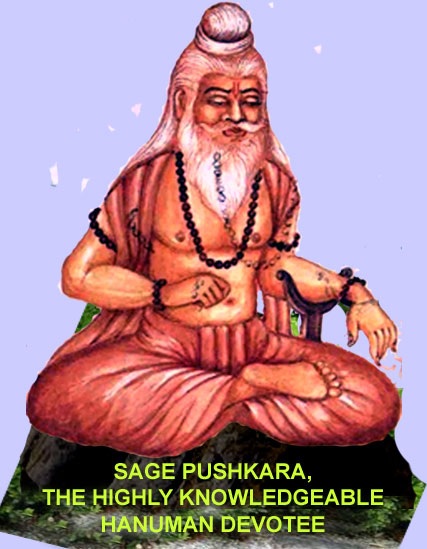
इति निश्चितवान् विप्रो नत्वैवं गुरुवैभवम्
चिरायापि महामंत्रसिध्यभावाद्द्विजोत्तम:।। 6
Only the God is worthy of worship. Considering that mantra is more worthy of worship, never thought of the Guru and finding tha mantra not fructifying even after a long time, that Brāhmin
निर्वेदं परमं चागात् गुरुविश्वासवर्जनात्
सिद्ध्यभावे निदानं यत् गुरुविश्वासवर्जनम्
एवं न ज्ञातवान् विप्र: तदेव ज्ञातवान् गुरु:।। 7
Had encountered great disappointment because faith in the Guru was missing. That Brāhmin never realized the reason for his disappointment, One who know the path only is the best.
सप्तकोटिषु मंत्रेषु विद्यमानेषु पुष्कर:
दिष्टवान् जडमंत्रं मे यतस्तन्मंत्रवंचक:।। 8
Dhwajadatta Misunderstands Puşkara
(He thought that) ‘While there are 70 million mantras that cheat of a scholar Puşkara told me only this worthless mantra.
महांतो मुनयस्संति तानवेक्ष्यायमर्थित:
मां जहाति न दौर्भाग्यं वने वा पट्टणे पि वा
इत्येवं खिद्यचेतास्सन् जपादुपरतो भवत्।। 9
There are many great sages. Leaving all of them, I begged this person. The utter destitution is leaving, neither in the city nor in the forest. So grief-stricken, he stopped recitation.’
अथास्मिन्न्ंतरे व्याधो गालो नाम महाधनु:
महाव्याधिपरीतांगो दु:खितो व्याधिपीडया।। 10
During that very time, a great hunter by name Gāla of kirāta (inhabitant of certain Himalayan region) tribe was afflicted by a severe malady and was crying with pain due to that disease’.
मृगयावशमापन्नो नैमिषारण्यमाविशत्
ध्वजदत्तं ददर्शादौ दरिद्रध्वजमुत्तमम्
तत्समीपं समागत्य व्याधो वचनमब्रवीत्।। 11
During hunting that hunter entered the Naimiśa forest. He saw the most destitute yet venerable Dhwajadatta. He went near him and said,
ब्रह्मान्! मे व्याधिपीड़ास्ति केनोपायेन शाम्यति?
तमुपायं वद स्वामिन्! त्वत्सेवां करवाण्यहम्।। 12
Oh! Steady minded Sir! I am suffering with a disease. In what method can it be alleviated? Kindly let me know such a method. I will personally serve you (in return).’
इत्युक्तशेन् विप्रो पि व्याधं चेदमुवाच ह
अहं दारिद्र्यदु:खाब्धौ मग्नस्त्वां कथमुद्धरे?
कशित्पुष्करनामास्ति ह्मारादत्रैव लक्ष्यते।। 13
Upon this Dhwajadatta said so the hunter. ‘How can I, a person drowned in the ocean of grief due to destitution, can help you? There is a man named Puşkara close by. That one visible there.
तमुद्दिश्य न गन्तव्यं यतो वंचकशेखर:
दरिद्रताविनाशाय बहुधा प्रार्थितो मया
मंत्राभासं ममादिश्य वंचयित्वा गतो यत:
मंत्राभासं जपन्भूय:-सिद्धिं नैवाप्नुयामहम्।। 14
Don’t go to him. Because he is a well-known cheat. On prying him earnestly for getting rid of my destitution, he told me something that only looked like a mantra.
दुश्चर्यं हि तपस्तप्तं तत्तथा पि न सिध्यति
पुरश्चर्याश्च बहुधा कृतास्सिद्धिर्न दृश्यते
तस्मात् प्रारब्धकर्माणि भोक्तव्यानि न संशय:।। 15
Even after performing rituals and recitations of that fallacious mantra I am not benefited. I repeated it many times systematically. Even then there was no result. So, one has to suffer the destiny, results of one’s past deeds.
दैवं नास्ति मनुर्नास्ति गुरुर्नास्तीति मे मति:
अथवा विद्यते मंत्रो गुरुर्वा दैवतं तथा
किंतु पुष्करमासाद्य मागृहणीष्व मनुं त्विमम्।। 16
I think that there is no god, no mantra, no Guru. Even if there is a god, mantra or Guru, do not go to Puşkara to learn a mantra.
इत्युक्तं ध्वजदत्तेन व्याधश्श्रुत्वा प्रियं वच:
ध्वजदत्तनिषिद्धो पि दिदृक्षु: पुष्करं मुनिम्।। 17
Gāla Seeks Puşkara
Hearing such precious words from Dhwajadatta, the hunter became enthusiastic to meet that sage Puşkara even after dissuasion by Dhwajadatta.
निवृत्तिकामो रोगस्य तमेव शरणं ययौ
अब्रवीत्पुष्करं व्याध: साष्टांगनतिपूर्वकम्।। 18
With the intention of getting rid of his malady, he went and begged help from the same Puşkara. Falling prostrate at his feet the hunter said so to him,
जात्याहं मृगयुब्र्रह्मन् गालो नाम्ना महामुने!
व्याधिना दुर्निवारेण पीड्यमानो दिवानिशम्।। 19
‘I am from the kirāta tribe. I am named Gāla. Oh! Great sage! I am suffering day and night by the unstoppable disease.
अन्नं न रोचते मह्नां न वा भार्या तिसुंदरी
न वा वस्त्राणि मुख्यानि सुगंधकुसुमान्यपि।। 20
I am averse to food, beautiful wife, or main clothes or nicely scented flowers.
चंदनं चंद्रविंबाभं शय्या वा हंसतूलिका
रसाश्च षड्विधा वा पि न रोचंते महामुने! 21
Oh! Great sage! I am not able to enjoy the feel the fragrance of the moon-cool sandal wood paste, softness of beds made of the down feathers of swan or feels the of the six tastes (sweet, bitter, salty, sour, pungent and bitter.
नोत्सहे कानि वस्तूनि व्याधिग्रस्त: निरंतरम् 22
I am not having desire on anything due to the continuous pain caused by this disease.
आखेटनापदेशेन पर्यटन्गहनांतर
पूर्वजन्मार्जितात्पुण्यादद्राक्षं त्वां महामुने! 23
Oh! Great sage! I could see your revered self, due to my past good deeds, as I was roaming in this forest for hunting.
अधुना हं कृतार्थोस्मि मन्ये व्याधिं विनाशितम् 24
Now I have attained the objective. I am feeling as if I am getting rid of my disease.’
सम्य क्परीक्षितुं शीलं व्याघस्य मुनिसत्तम:
सन्मुहूतपिदेशेने कालेक्षपं चकार स:।। 25
Sage Puşkara, wanting to test the character of the hunter completely, whiled away time waiting for an auspicious time.
तथापि मृगयर्गाल: परिचर्यामुपाचरत्
फलानि परिपक्वानि मधुरास्वादनानि च
मुनये दत्तवान् गालो गृहीत्वा वनगह्ररात्।। 26
Gāla’s Determination
Even then, Gāla, the kirāta continued serving. He collected ripe fruits from the forest and provided to Puşkara.
समित्पलव पुष्पाणि बर्हिश्चा पि सकंदकम्
समाहत्यार्प्ंयामास् पुष्कराय महात्मने।। 27
Also, he brought for Puşkara dry twigs, tender leaves, flowers and kuśa (sharp) grass blades (Darbha, botanically – Cynodon dactylon) and submitted to Puşkara (for use in pious rituals).
मौनमेव समास्थाय परीक्षन् व्याधवर्तनम्
मनसैव मुमोदांत: तस्य विश्वासदर्शनात्।। 28
But, still Puşkara was observing the hunter’s behavior, remaining quiet and without accepting any thing. Yet feeling happy at the devotion of the hunter.
एवंबहुविध: काल: तस्या भूत्परिचर्यया
उत्तरोत्तरमत्यंतं विश्वासं लभते स वै।। 29
A long time passed with just service (by the hunter) only. Gradually, he (Puşkara) was getting assured (of the nature of the hunter).
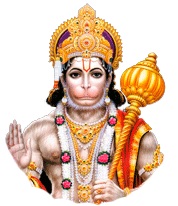 तमेवं परिचर्यतं व्याधं व्याधिनिपीडितम्
तमेवं परिचर्यतं व्याधं व्याधिनिपीडितम्
कृपया वीक्षयामास कदाचित्पुष्करो मुनि:।। 30
Once the great sage Puşkara looked compassionately at the hunter, who was trying to gain his goodwill, unmindful of personal difficulties.
कृपया वीक्षणादेव गालस्संह्रष्टमानस:
निवृत्तां तु तदा मेने रोगार्तिं भयपीडित:।। 31
Disease stricken Gāla was happy with that kind look and felt that his ailment abated.
अब्रवीत्पुष्करो वाक्यं-व्याधं गुरुपरायणम्।। 32
Puşkara said so about the hunter, so devoted to the Guru.
व्याधस्य मंत्रदानार्थ्ं सदेहेन महामुनि:
हनूमंतं निजाभीष्टं दध्मौ दैवतशेखरम्।। 33
Initially doubtful about teaching the mantra to Gāla, a kirāta, great sage Puşkara prayed as follows to Lord Hanumān, his most favourite among all the Gods.
हनुमान्! देवदेवेश! स्वभक्तानां परिपालक!
श्रीरामचन्द्रसंप्रीतिकारण! त्वामुपाश्रये।। 34
‘Hanumān! God of Gods! Protector of Your devotees! The very cause of Lord Śrīrāma’s happiness! I am seeking your sanctuary.’
ध्यातश्च हनूमांस्तेन भक्ताभ्याशमुपागमत्।। 35
So meditated upon, Hanumān came towards Puşkara.
सुवर्णकुंडलज्योतिर्दीप्तं गडस्थलद्वयं
हेमोपवीतसंवीतो दिव्यपीतांबरावृत:।।
रत्नकंकणसन्नदी ध्वनन्मंजीरमंजुल:
नवरत्नांशुसंवीत: महार्हमुकुटोज्जल:।।
पश्चाल्लम्बशिखोपेत: क्वथितस्वर्णवर्णक:
सुवर्चलां दधानश्च वामभागे निजप्रियाम्।। 36
Hanumān to the Rescue
And that Hanumān had cheeks that shined in the glow of golden ear-rings, awore a golden sacred thread and wonderful silks, splendorous with the sweet sounds created by the dimond studded anklets, radiant in his golden crown studded with nine types of precious stones, his hanging mane decorated with golden plate, seating His dear wife Suvarcchala to His left,
हनुमत्पादपद्मांतन्यस्तनेत्रमधुव्रताम्
ध्यायंतीं ह्र्दि भर्तारं पार्वतीमिव शंकरम्।। 37
And she, with her black bee like eyes looking at His lotus feet, always meditating on her husband like Pārvati on Śiva,
कंबुकंठीं महाभागां पीनोन्नतकुचद्वयीम्
किंकिणीजालसन्नदिमेखलादामशोभिताम् 38
With a conch like neck, big breasted, wearing a golden hip girdle (mēkhalā) with tingling little bells,
पदांगुष्ठनखज्योतिर्जितोद्यच्चन्द्रमंडलाम्
आदर्शसदृशप्रख्यगंडभागस्फुरन्मुखाम्।। 39
Having a face akin to the full moon that was (once) won over by the radiance of the nail of her big toe, a face radiant with mirror like cheeks,
स्वर्णताटंकसंरोचिश्रीकारसदृशश्रवाम्
नवचंपकसूनाभनासां चंद्रनिभाननाम्।। 40
With letter ‘Śrī’- shaped (fine) ears shining off her ear studs, nose like a just blossomed campaka (botanically Michelia champaca). flower, moon like face,
कर्णान्तायितनेत्रां तां कामचापायितभ्रुवाम्
मयूरबर्हधम्मिल्लां-कलहंसगतिस्थिताम्।। 41
Having wide eyes that extend up to the ears, Cupid’s bow like eye brows, hair like that of the plumage of a peacock, gait like that of a swan,
पक्वविंबाधरोष्ठीं तां स्फुरद्दशनदाडिमाम्
मुक्तातिलकसंदीप्तफालपट्टांशुमध्यमाम्।।42
Having lips like ripe ivy gourd fruit (botanically Coccinia grandis), pomegranate seed like shining teeth, forehead adorned with a pearly married woman’s dot mark, with a sprightly lower back,
शिरीषपुष्पमृद्व्ंगबाहुयुग्ममनोरमाम्
अंगुलीयकमुद्रांतस्फुरदंगुलिपाणिना
वीजयंतीं स्वभर्तारं चामरेण शनैश्शनै:।। 43
Beautiful with two like arms that are soft śirīşa (botanically – Accasia irissa) flower, fanning her husband with a hand – whisk (fan = chaamara) held in fingers radiant with the rings worn,
रंभासौंदर्यसर्वस्वहारिरंभोरुसंभ्रमाम्
सिकतामयसौंदर्यजघनां गणविभ्रमाम्।। 44
Having inner banana stem (smooth and white) like thighs that beat the beauty of the heavenly dancer (apsara) Rambha, and pretty buttocks sand dumes like,
आवर्तनिम्नविवरस्फुरन्नभिगुहांतराम्
रक्तपंकेरुहप्रख्यरोमराजिविराजिताम्।। 45
Having a whirly navel depression and brilliant with red lotus like fine hair,
मुक्तहारस्फुरद्ग्रीवां सर्वाभरणभूषिताम्
मंदस्मितां सुवर्णाभां सूर्यपुत्रीं सुवर्चलाम्।। 46
Having neck shining with a pearl necklace, wearing different ornaments on the body nicely, ever smiling golden hued daughter of the Sun god Suvarcchala
कौशेयं परिधानं च दधानां च कुशेशयम्
एवं सर्वगुणोपेतां प्रेयसीं मारुतात्मज:
वामभागे वहन् भार्यां क्षणात्प्रादुरभून्मुने।। 47
Wearing silks and holding a lotus, along with His such dear consort to His left side, Lord Hanumān, gave divine vision of himself to the great sage Puşkara.
करभकलभवाह: स्वर्णरंभावनांत:
प्रचलदचलशृड्गव्यक्तचंचत्कराब्ज:
अधिकुतलमगात्तत्पुष्कराधिष्ठितं यत्
रविसुतकरधारी लंबहारो हनूमान्।। 48
One having a bull-elephant-like young camel as vehicle, one who looks in a golden banana garden like a moving top of a mountain, who has a radiant lotus like hand, one holding the hand of the Sun god’s daughter Suvarcchala, one with hanging golden ornamental chain, such Hanumān divinely appeared at the place of Puskara.
इति श्रीपराशरसंहितायां पंचमुखहनुमद्विवरणे श्रीपराशर मैत्रेयसंवादे सूर्यसुताकथनं नाम दशम: पटल:।।
Thus ends the 10th Chapter, entitled “The Story of Sun God’s Daughter” of Śrī Parāśara Samhitā
![]()
Devanagari transliteration

Click here to visit the Contents of the Part 1.
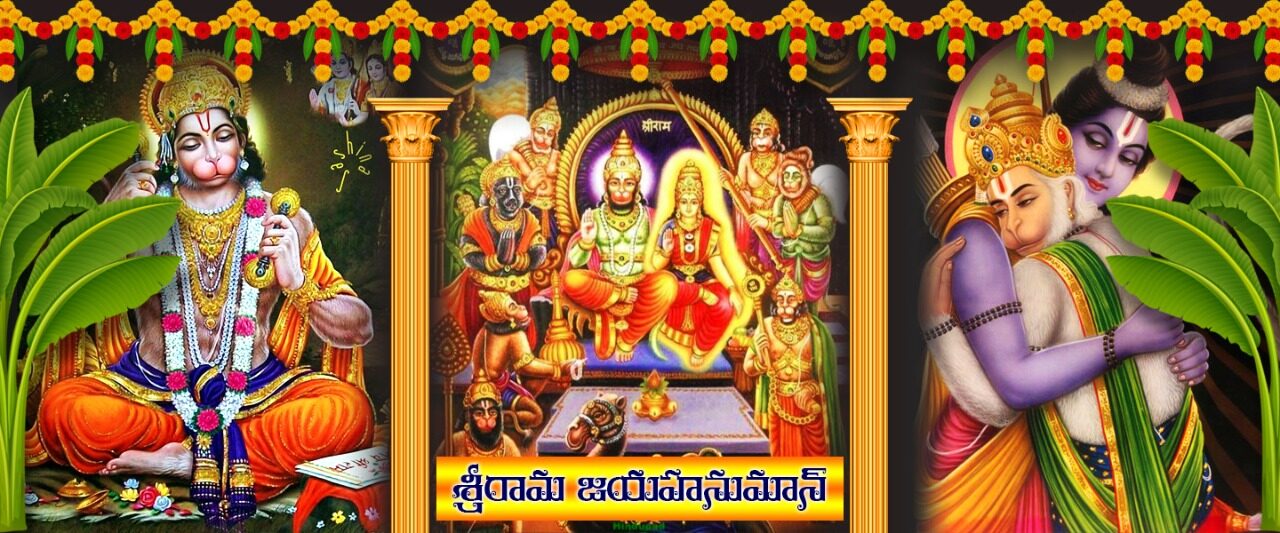


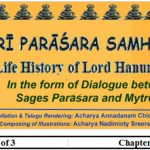

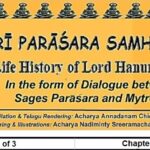

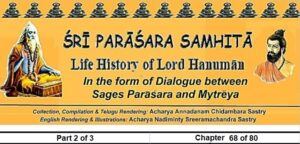
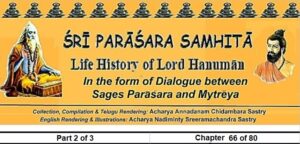
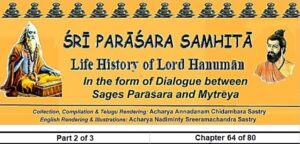
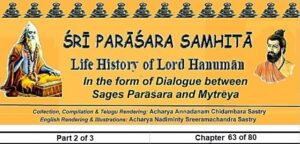
Be First to Comment